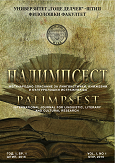МИНИ-ЕСЕЈОТ КАКО ФОРМА ВО ЕСЕИСТИЧКИОТ ОПУС НА ГОРАН СТЕФАНОВСКИ
MINI-ESSAY AS A FORM IN GORAN STEFANOVSKI’S ESSAYISTIC WORKS
Author(s): Ivan AntonovskiSubject(s): Fiction, Macedonian Literature, Theory of Literature
Published by: Универзитет »Гоце Делчев« - Штип
Keywords: mini-essay; draft-essay; Goran Stefanovski; conserved impressions; form; essay.
Summary/Abstract: While the form of mini-essay or draft-essay is not yet firmly standardized in literary theory, its presence in literary space cannot be neglected, especially since it is one of the most common forms of expression of the author's essayistic I at present. Hence, this literary form deserves reference in the critical and theoretical reading of contemporary literature, which can lead to new theoretical insights. This paper addresses its presence in Goran Stefanovski's essayistic works through “conserved impressions” most of which were first published in the eighth and ninth decades of the last century. Reading them in the context of Stefanovski's entire essayistic works, the mini or draft essay is confirmed as the exclusivity of literary essayism. Considering Stefanovski's essayistic works as a result of a creative thought process, this paper suggests that “impressions”, such as mini or draft essays, can be regarded as the first phase of the process in which essay perceptions and reflections on identity issues and dilemmas present in some of them, which dominate his further essays in terms of topic and motive, go through a process of creative thinking as well as experiential and cognitive observational initiation, which evolves their explication in the essay text to the level of hyper-essay. The paper also points to the conclusion that essayism should not and cannot be fully considered as a much later manifestation in Stefanovski's work, and that the topic and motive dominating his later essays should not be attributable exclusively to the state of voluntary two-home exile and the post-Yugoslav context.
Journal: Палимпсест, Меѓународно списание за лингвистички, книжевни и културолошки истражувања
- Issue Year: 6/2021
- Issue No: 11
- Page Range: 191-200
- Page Count: 10
- Language: Macedonian

